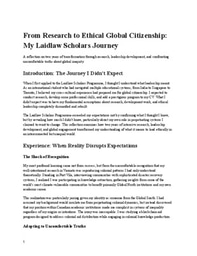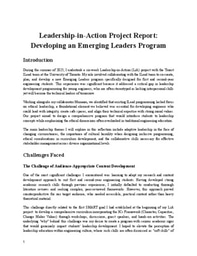Weekly LIA Log 3: Balancing Audience Needs, Discovering Passions, and Refining Communication Skills
What went well?
I made significant strides in refining the curriculum design by returning to the drawing board to create a more balanced approach. This revision successfully integrated ethical leadership principles, including values, integrity, authenticity, and equity, diversity, inclusion, and accessibility (EDIA), with foundational leadership skills that are essential for emerging leaders. The restructuring process allowed me to create a more cohesive learning experience that addresses both the moral and practical dimensions of leadership.
Our collaborative workflow evolved effectively as we established a strong asynchronous working rhythm with robust document versioning practices. This systematic approach ensured that no previous iterations were lost while allowing for seamless collaboration and iteration. The version control system became particularly valuable when we needed to reference earlier concepts or revert certain changes, demonstrating the importance of organized project management.
A major milestone was achieved when the initial program plan received positive feedback from the ILead director, who provided the official greenlight to launch the course this fall. This validation confirmed that our strategic direction aligned with organizational goals and student needs. Additionally, I successfully completed the comprehensive 5-week facilitator guide and script, which now awaits team review and feedback, representing a substantial deliverable that moves us closer to implementation.
What could have been done differently?
My research approach revealed a significant learning opportunity regarding audience-appropriate methodology. I initially focused on conducting thorough literature reviews and identifying peer-reviewed frameworks, which became habitual after developing strong academic research skills. However, this approach proved counterproductive for our target audience of first and second-year students who need accessible, practical content rather than heavy theoretical frameworks.
The realization highlighted a crucial distinction between researching topics and researching for specific audiences. While the academic rigor was valuable for understanding leadership concepts deeply, the delivery method needed to be fundamentally different. Moving forward, I should use research to identify relevant topics and evidence-based practices, then translate these findings into simple, interactive frameworks and hands-on activities that resonate with novice learners.
This experience taught me the importance of adapting not just content but entire research and development methodologies based on audience needs rather than defaulting to familiar academic approaches. The shift requires consciously designing for accessibility and engagement rather than comprehensive coverage.
What did I learn about myself when working with others?
This project illuminated two core passions that drive my professional interests: conducting meaningful research and engaging in leadership discussions, particularly within engineering contexts. The enthusiasm I felt when diving deep into leadership literature and frameworks confirmed that these areas align strongly with my intrinsic motivations and career aspirations.
An interesting tension emerged between feedback from my workplace mentor and my personal convictions about professional development. While my mentor consistently recognizes my initiative and natural leadership qualities, they advocate for prioritizing technical skill development, arguing that industry leadership in engineering requires technical excellence as a foundation. Their perspective reflects a traditional career progression model where technical expertise precedes leadership opportunities.
However, I hold a fundamentally different philosophy about professional development. I believe that technical skills develop naturally through consistent practice in academic and professional settings, but leadership capabilities require intentional cultivation that cannot be easily acquired later. This philosophical difference reflects deeper values about holistic professional development and the importance of developing both technical and leadership competencies simultaneously rather than sequentially.
The challenge this creates is learning to navigate situations where my enthusiasm for leadership development may not be universally shared. I need to develop greater sensitivity to others' priorities and interests while finding effective ways to communicate the value of leadership development without imposing my perspective. This requires refined emotional intelligence and adaptive communication skills.
What did I learn about leadership?
Communication effectiveness extends far beyond my previous understanding of keeping messages short and concise. While brevity remains valuable, true communication excellence requires sophisticated audience awareness and message tailoring. Effective leaders must adapt their communication style, medium, and approach based on their audience's knowledge level, learning preferences, and contextual needs.
This insight expanded my understanding of communication to include comprehensive preparation strategies such as creating prerequisite materials that help audiences engage more effectively, designing visual aids that enhance comprehension, and planning interactive activities that reinforce key concepts through experiential learning. Leadership communication is thus revealed as a multifaceted skill that requires strategic planning and creative implementation rather than simply clear speaking or writing.
The experience also highlighted that leadership development itself requires modeling the principles being taught. By struggling with audience-appropriate communication in curriculum design, I gained firsthand experience with the challenges leaders face when trying to influence and educate others effectively.
What do I want to develop or focus on next?
Building on insights from previous weeks, I recognize the ongoing challenge of creating effective assessment and reflection tools. The focus has evolved from simply finding good inventory tools to designing a balanced ecosystem of learning reinforcement that includes both knowledge assessment and personal growth facilitation.
The strategic approach now involves creating complementary assessment methods: quizzes that test conceptual understanding and ensure knowledge retention, paired with reflective prompts in a personal leadership growth journal that provides a safe, non-judgmental space for deeper introspection and application.
The critical design challenge I need to resolve is determining the optimal distribution of reflective activities between group sessions and private journaling. Some reflection prompts will be most valuable when used to generate discussion and shared learning experiences during sessions, allowing participants to learn from diverse perspectives and build community. Other prompts may be more effective as private writing exercises that encourage honest self-examination without the potential influence of peer judgment or social dynamics.
This distinction requires careful consideration of learning objectives, psychological safety, and group dynamics. I need to develop criteria for categorizing reflection activities and design session structures that maximize both individual growth and collective learning while respecting the varying comfort levels participants may have with sharing personal insights.



Please sign in
If you are a registered user on Laidlaw Scholars Network, please sign in